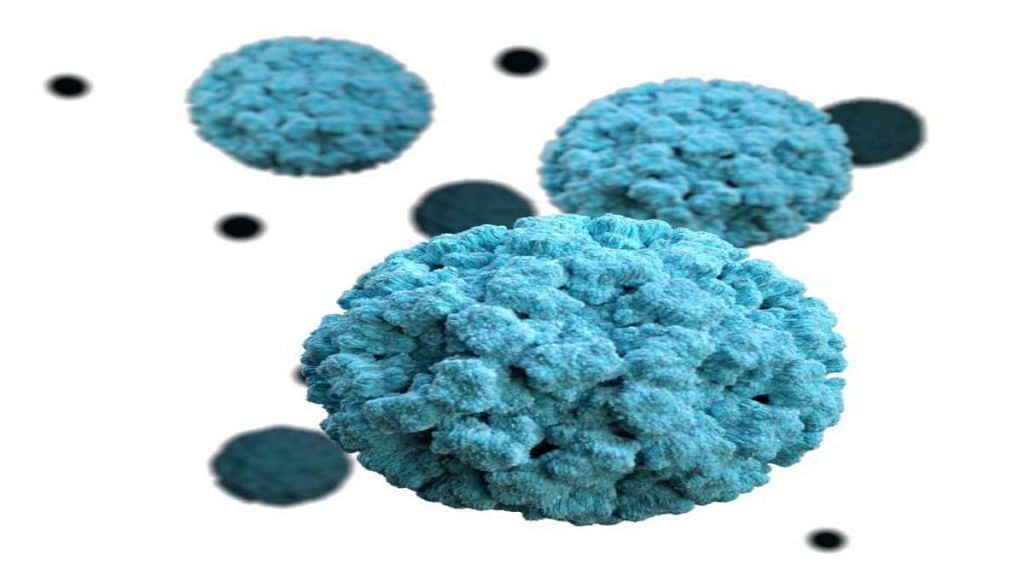New Delhi: Just as Covid seems to be under control in India, two cases of norovirus — which is associated with diarrhoea and vomiting — in Kerala have caused concern. Although this isn’t the first time the virus has been detected in the southern state, it is the high degree of infectiousness that is the reason for alarm, as is the fact that both the cases reported so far are children.
The central government asked Kerala’s State Surveillance Office (SSO) Monday to submit a detailed report on the state’s norovirus cases. Meanwhile, the highly contagious nature of the virus has prompted the state government to urge the public to maintain good hygiene.
“Norovirus infection has been detected in two children and their health condition is stable. There is no need to be concerned at the moment but everyone should remain careful and maintain cleanliness,” news agency PTI quoted Kerala’s Health Minister Veena George as having said.
The latest cases came a year after Kerala recorded its first outbreak of norovirus in June 2021 when 950 cases of acute diarrhoeal illnesses in Alappuzha and nearby municipalities were linked to the virus.
Also Read: DCGI approval in, but here’s why you can’t choose Corbevax as your booster just yet
‘Winter vomiting bug’
Norovirus, also known as the “winter vomiting bug”, causes acute gastroenteritis — an inflammation of the stomach and intestines — and is associated with vomiting and diarrhoea.
According to the National Health Service, Scotland, it’s called a winter bug because it’s more common in winter, although you could catch it anytime of the year.
According to the World Health Organization (WHO), an estimated 685 million (68.5 crore) cases of norovirus are recorded every year globally — including 200 million (20 crore) among children under 5.
It causes an estimated 200,000 deaths a year — including 50,000 children. The casualties are higher in low-income countries.
WHO estimates put healthcare costs and economic losses on account of the virus at $60 billion globally.
Since it’s from a family of viruses, it’s possible to contract the infection several times during one’s lifetime.
What are the symptoms?
Apart from the stomach-related symptoms, patients infected with the virus could also have high temperature, bodyache and headache.
The incubation period for the virus is short — about 1-2 days. The pathogen is known to be highly infectious although estimates of its infectivity — calculated as the R value — tend to vary widely.
The R value, denoted as ‘R0′, is the basic reproduction rate or the reproduction number that represents the degree of infectiousness of a virus. It is an estimate for the number of people an infected person could spread the virus to. An R value of 1, for instance, means that every infected person could infect one other person. An R0 of less than 1 means a disease will not grow to epidemic proportions.
“However, we found that the values of the basic reproduction number for norovirus varied widely, from 1.1 to 7.2. In general, population-based estimates of R0 are around 2, with higher values estimated for particular outbreaks,” researchers from University of Cambridge wrote in a 2018 article in the journal Epidemiology and Infection.
What happened in Kerala and how the virus is treated
Kerala’s latest cases were detected in two students of a government upper primary school at Kayamkulam in Alappuzha district. The two were admitted to hospital Saturday over what doctors had first suspected to be a case of food poisoning.
Last year’s outbreak, also in June, lasted a month-and-a-half, Outlook reported Monday. The report also quoted government officials from Kerala as saying that 92 per cent of norovirus patients required only out-patient care during the previous outbreak last year .
Norovirus spreads through direct contact with an infected person, through infected food, and also if a person touches a contaminated surface and then puts their hand in their mouth without washing.
The most crucial aspect of treating norovirus infection is to prevent dehydration. Replenishing the water that the body has lost because of diarrhoea and vomiting is key.
Patients need to drink copious amounts of fluids and could also be administered the oral rehydration solution. There is no specific medicine to treat the illness. In children, wailing could often be a sign of dehydration, as could the drastic reduction in urine volume.
(Edited by Uttara Ramaswamy)
Also Read: ‘Low booster dose uptake, restrictions lifted too soon’ — factors driving Mumbai Covid surge
